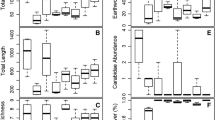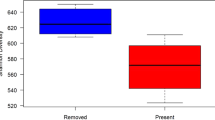Abstract
Association analysis was used to assess relationships among 25 important alien plant species and their association with feral pig rooting in Hawaii Volcanoes National Park, Hawaii, U.S.A. Results of the association analysis were summarized by means of a simplified, rank-based, polar ordination which yielded three subjective species assemblages. One group was characterized by an association with the endpoint species, Ehrharta stipoides. A second group consisted of species associated with the other endpoint species, Andropogon virginicus. The third group comprised a diverse assemblage of 14 species in the middle of the ordination.
Comparison of ordination scores with each species's association with pig-induced soil disturbance revealed that members of the Ehrharta group were strongly positively associated with pig activity, whereas members of the Andropogon group were generally negatively associated. The third group showed no association with pig-induced soil disturbance.
These results suggest a strong relationship between feral pig activity and the composition of the alien portion of the plant community. Analysis of the ecologies of both plants and pigs suggests that some species may both encourage pig activity and benefit from it. Likewise, other alien plants appear to neither require nor benefit from pig-induced soil disturbance. While pigs appear to play an important role in the organization of these communities, their removal may have a negligible impact on the success of many of the common weeds in the area.
Similar content being viewed by others
References
Aplet, G. H. 1990. Alteration of earthworm community biomass by the alien Myrica faya in Hawai'i. Oecologia 82: 414–416.
Baker, H. G. & Stebbins, G. L. 1965. The genetics of colonizing species. Academic Press, New York.
Baker, H.G. 1974. The evolution of weeds. Ann. Rev. Ecol. Syst. 5: 1–24.
Beals, E. W. 1965. Ordination of some corticolous cryptogamic communities of south-central Wisconsin. Oikos 16: 1–8.
Carlquist, S. 1980. Hawaii: a natural history. Pacific Tropical Botanical Garden, Lawai.
Diong, C. H. 1983. Population biology and management of the feral pig (Sus scrofa L.) in Kipahulu Valley, Maui, Ph.D. thesis, University of Hawaii, Honolulu.
Gagne, W. C. 1983. New invertebrate hosts of greensword (Argyroxiphium virescens). Proceedings, Hawaiian Entomological Society 24: 190.
Jacobi, J. C. 1981. Vegetation changes in a subalpine grassland in Hawai'i following disturbance by feral pigs. Technical Report 41. Cooperative National Park Resources Studies Unit, University of Hawaii at Manoa, Honolulu.
Katahira, L. 1980. The effects of feral pigs on a montane rain forest in Hawaii Volcanoes National Park. Proceedings of the Third Hawaii Volcanoes National Park Natural Science Conference, pp. 173–178. University of Hawaii, Honolulu.
Mueller-Dombois, D. & Fosberg, F. R. 1974. Vegetation map of Hawaii Volcanoes National Park. Technical Report 4. Cooperative National Park Resources Studies Unit, University of Hawaii, Honolulu.
Pielou, E. C. 1974. Population and community ecology. Gordon and Breach, New York.
Rice, E. L. 1972. Allelopathic effects of Andropogon virginicus and its persistence in old fields. Am. J. Bot. 59: 752–755.
Smith, C. W. 1985. Impact of alien plants on Hawai'i's native biota. In: Stone, C. P. & Scott, J. M. (eds.), Hawaii's terrestrial ecosystems: preservation and management. pp. 180–250. Cooperative National Park Resources Studies Unit, University of Hawaii, Honolulu.
Sohmer, S. H. & Gustafson, R. 1987. Plants and flowers of Hawai'i. University of Hawaii Press, Honolulu.
Spatz, G. & Mueller-Dombois, D. 1975. Succession patterns after pig digging in grassland communities on Mauna Loa, Hawaii. Phytocoenologia 3: 346–373.
Stone, C. P. 1985. Alien animals in Hawai'i's native ecosystems: toward controlling the adverse effects of introduced vertebrates. In: Stone, C. P. & Scott, J. M. (eds.), Hawaii's terrestrial ecosystems: preservation and management. pp. 251–297. Cooperative National Park Resources Studies Unit, University of Hawaii, Honolulu.
Stone, C. P. & Anderson, S. J. 1988. Introduced animals in Hawai'i's natural areas. In: Crab, A. C. & Marsh, R. E. (eds.), Proceedings of the 13th Vertebrate Pest Conference. pp. 134–140. University of California, Davis.
Stone, C. P. & Loope, L. L. 1987. Reducing negative effects of introduced animals on native biotas in Hawaii: what is being done, what needs doing, and the role of national parks. Env. Cons. 14: 245–258.
Vitousek, P. M. & Walker, L. R. 1989. Biological invasion by Myrica faya in Hawai'i: plant demography, nitrogen fixation, and ecosystem effects. Ecol. Monogr. 59: 247–265.
Wagner. W. L., Herbst, D. R. & Sohmer, S. H. 1990. Manual of the flowering plants of Hawai'i. University of Hawaii Press/Bishop Museum Press, Honolulu.
Warshauer, F. R. & Jacobi, J. D. 1982. Distribution and status of Vicia menziesii Spreng. (Leguminosae): Hawai'i's first officially listed endangered plant species. Biol. Cons. 23: 111–126.
Whiteaker, L. D. & Gardner, D. E. 1985. The distribution of Myrica faya Ait. in the State of Hawai'i. Technical Report 55. Cooperative National Park Resources Studies Unit, University of Hawaii at Manoa, Honolulu.
Author information
Authors and Affiliations
Additional information
Nomenclature: Wagner, W. L., Herbst, D. R., & Sohmer, S. H. 1990. Manual of the Flowering Plants of Hawai'i. University of Hawaii Press/Bishop Museum Press, Honolulu.
Rights and permissions
About this article
Cite this article
Aplet, G.H., Anderson, S.J. & Stone, C.P. Association between feral pig disturbance and the composition of some alien plant assemblages in Hawaii Volcanoes National Park. Vegetatio 95, 55–62 (1991). https://doi.org/10.1007/BF00124953
Accepted:
Issue Date:
DOI: https://doi.org/10.1007/BF00124953




